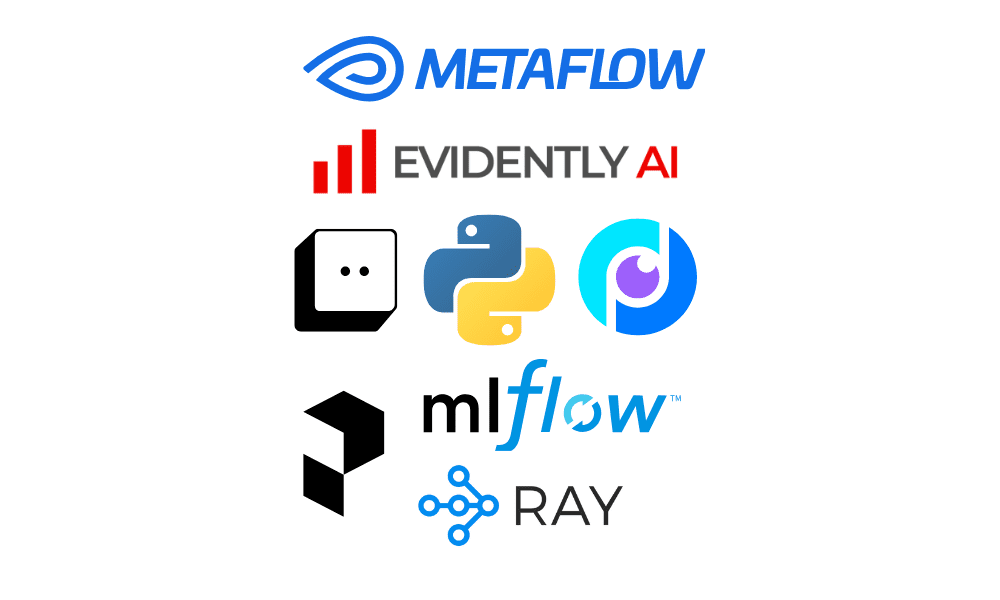7 Essential Python Libraries for MLOps
Popular MLOps Python tools that will make machine learning model deployment a piece of cake.

Image by Author
Many large companies have developed their own in-house MLOps solutions. However, did you know that you can also train, evaluate, and deploy models like these organizations using simple and open-source Python libraries? In this article, we will explore seven essential Python packages that you can use for experiment tracking, machine learning orchestration, model and data testing, model serving, managing and scaling machine learning models, monitoring model performance in production, and optimizing resources for faster inference times.
1. MLflow
MLflow is an open-source framework that manages the complete machine learning lifecycle, from experimentation to deployment. It offers four key components:
- Tracking: Log parameters, metrics, and artifacts from your machine learning model runs.
- Projects: Package data science code in a reusable, reproducible form.
- Models: Deploy models from any ML library in a variety of ways.
- Registry: Centralized model store, set up for collaborative work.
MLflow is often used for machine learning experiment tracking and model registry, but we can also efficiently server and deploy models. Moreover, it offers a set of tools for evaluating large language models.
2. Prefect
Prefect is a workflow orchestration tool that simplifies the scheduling and monitoring of machine learning workflows. It excels in:
- Ease of Use: By using the Python decorator, you can create tasks, and flow.
- Dynamic Workflows: Adapt and change workflow behavior based on dynamic conditions.
- Robust Execution: Ensure tasks are executed reliably with retry mechanisms and state management.
Prefect also offers a managed service platform and interactive dashboard. We can trigger the workflow, monitor it, and compare it all in the dashboard, which you can share with your team.
3. Deepchecks
Deepchecks provides a comprehensive suite of tests to validate machine learning models and data. It focuses on:
- Data Integrity: Identify anomalies and validate data distributions.
- Model Evaluation: Run checks to ensure model performance is robust across various scenarios.
- Continuous Integration: Integrate testing into CI/CD pipelines to catch issues early.
With a few lines of code, DeepCheck will run the full suite of tests on our data and model so that we can review it before pushing it to production. We can also automate this process using GitHub actions or any CI/CD tool to create conditions; if certain conditions are met, then push the model to production.
4. BentoML
BentoML is a flexible and scalable model serving tool that simplifies the deployment of machine learning models. Key features include:
- Bento: package all the necessary packages and dependencies.
- High Performance: Serve models with minimal latency and high throughput.
- Deployment Options: Deploy models on various platforms, including cloud services and custom infrastructures.
- One-click deployment: BentoCloud is a fully managed platform that easily hosts and manages machine learning applications.
BentoML streamlines the path from model development to production, ensuring that the deployment process is as seamless and efficient as possible.
5. Metaflow
Metaflow, developed by Netflix, is a framework that simplifies building and managing real-life machine learning projects. It offers:
- Version Control: Track the complete lineage of your machine learning projects.
- Scalability: Effortlessly scale workflows to the cloud.
- Data Management: Simplify data loading, transformation, and management within workflows.
Metaflow bridges the gap between machine learning engineers and DevOps engineers, allowing machine learning professionals to focus on building models without worrying about the underlying infrastructure. It leverages Kubernetes clusters for scalability and automatically tracks all workflows, experiments, and artifacts. Additionally, Metaflow provides orchestration and simplifies access to data from data warehouses and lakes. In short, it feels like having an engineering team on your side to handle all the heavy lifting.
6. Evidently AI
Evidently AI is a library for monitoring machine learning models in production. It provides:
- Real-time Monitoring: Track model performance metrics and data drift in real-time.
- Testing Suite: verify whether computed metrics satisfy defined conditions.
- Interactive Reports: Generate detailed reports to understand model behavior and performance.
- Customizable Dashboards: Create dashboards tailored to specific monitoring needs.
Evidently AI ensures that models continue to perform well in production, providing early warning signs of degradation and facilitating proactive model maintenance.
7. Ray
Ray is an open-source framework for building and scaling distributed applications, ideal for machine learning workloads. It supports:
- Parallel and Distributed Computing: Run ML workloads in parallel across multiple CPUs and GPUs.
- Flexible API: Easily scale Python code from a laptop to a cluster.
- Integrations: Supports a variety of ML libraries, including TensorFlow and PyTorch.
- Deploy to the cloud: deploy a Ray cluster on AWS, GCP, Azure, and more with minimal code changes.
Ray enables machine learning engineers to leverage distributed computing to train, tune, and serve models more efficiently, making it an essential tool for scaling machine learning applications.
Final Thoughts
These seven libraries offer a comprehensive toolkit for managing the complexities of MLOps. With these Python tools, you can stop worrying about versioning, orchestration, testing, serving, project management, monitoring, and hardware optimization. All you need to do is start learning these tools and integrate them into your projects.
Abid Ali Awan (@1abidaliawan) is a certified data scientist professional who loves building machine learning models. Currently, he is focusing on content creation and writing technical blogs on machine learning and data science technologies. Abid holds a Master's degree in technology management and a bachelor's degree in telecommunication engineering. His vision is to build an AI product using a graph neural network for students struggling with mental illness.
